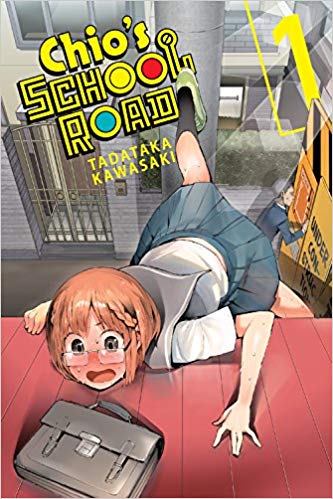By Tadataka Kawasaki. Released in Japan as “Chio-chan no Tsuugakuro” by Media Factory, serialization ongoing in the magazine Comic Flapper. Released in North America by Yen Press. Translated by Alexander Keller-Nelson.
Sometimes you can think yourself to death. We’ve all had that happen to us. You worry about how you’re going to achi9eve something, or how you’re going to talk to that person, or even how you’re going to get to school on time in the morning, your brain goes into overdrive, and you come up with some silly options that no one would actually do unless they were in some sort of comedy manga. Fortunately, Chio is in a manga, and so is able to do the silly things for our entertainment. A typical glasses-wearing, semi-introverted gaming girl, her late night habits lead her to be late almost every day, and things are not helped by random construction, or running into the popular girl and having to interact with her, or even just trying to find a bathroom. That’s the plot, really – we don’t really see Chio much at school, though she does have an equally socially inept friend. It’s just “what happens to Chio next?”.
I get the sense that the author came up with the idea for the first chapter and the publisher wondered what it would be like as a series, because “what if someone really did try to go roof hopping” really is a great one-shot premise, and it even gets highlighted in the cover art. It’s not as easy as it sounds, to no one’s surprise, especially when you’re trying to ensure no one notices you. The rest of the book is not quite as high concept – the chapters with Chio having to deal with interacting with other students, or talking with her equally unpopular friend about boys, are not quite as good as the rest of the book, and the reader gets the sense that this probably works better as a monthly serial in a magazine than it does collected into book form. (I’m also not sure the kissing in the back alley scene works well, as I suspect it will lead yuri readers to expect more tease that likely is not going to happen.)
The best chapters highlight the desperation of Chio’s needs and her motormouth inner monologue, where things just escalate to ridiculous levels. Getting past the gang member with his motorcycle in the path leads, inevitably, to Chio having to pretend to be a feared, deadly schoolgirl assassin, with appropriate glaring, and it’s quite well done, especially the anticlimactic payoff. Likewise, something as simple as Chio trying to find a bathroom spirals out of control and also highlights one of Chio’s other flaws, which is her selective obliviousness when it comes to digging herself into holes. I think whether you enjoy this book depends on how much you can tolerate Chio – she can be somewhat exhausting, and you get the feeling she’s her own worst enemy most of the time. Still, that’s the fun. As long as you don’t sympathize with her too much, Chio’s School Road should be a very entertaining series.

